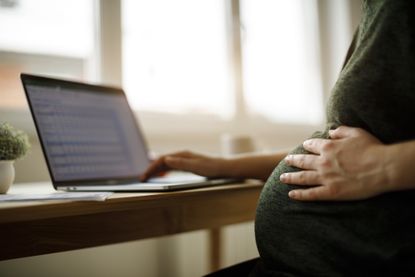Will maternity pay and leave be affected by the coronavirus pandemic?
It can be a worrying time...

The coronavirus pandemic is worrying for everyone, but there are even more things to consider if you are currently pregnant, or a new mother.
Aside from the main issue of keeping you and your unborn or newborn child safe and healthy, there's the very pressing issue of maternity leave.
If you are due to have your baby soon, or are already on maternity leave having given birth, you may be wondering whether your set-up with work will be affected by the pandemic.
So what are the legalities of leave and maternity pay during the coronavirus outbreak - are you still entitled to your full maternity pay and will your time away from work be affected by the virus?
We spoke to a legal expert in employment matters, to clear up any confusion...
Will maternity leave be affected by coronavirus?
Kirsty Churm, a Senior Associate in Kingsley Napley’s employment practice, explained that all employees are still entitled to maternity leave during the pandemic - but when it actually begins may be affected by the virus.
She said, "All employees are entitled to up to 52 weeks’ maternity leave. An employee’s entitlement to maternity leave will not be affected, so long as they comply with their employer’s notification obligations."
GoodtoKnow Newsletter
Parenting advice, hot topics, best buys and family finance tips delivered straight to your inbox.
"Usually the employee chooses when to start their maternity leave." However, Kirsty said, this start date may change as a result of social distancing measures, because of the coronavirus.
She continued, "However, maternity leave will start automatically if she is absent from work “wholly or partly because of pregnancy” after the beginning of the fourth week before her expected week of childbirth. This could apply if she is unable to work because she is socially isolating at home and unable to carry out her role in any capacity if working from home."
MORE: Am I allowed in my garden during lockdown and are kids allowed outside to play?
But, Kirsty told GoodtoKnow, coming down with the coronavirus will not spark maternity leave. "However, being unwell with coronavirus itself would not automatically start maternity leave early, because it’s unrelated to the pregnancy itself," she explained.
However, she said that the rules are a little more unclear if you have been put under furlough leave during the pandemic - e.g, your employer can no longer cover staff costs, meaning you have been asked to stop work but have not been fired or made redundant.
She said, "It is not yet clear how furlough leave will interact with other forms of leave, such as maternity and adoption leave. Furloughed employees will receive 80% of pay, capped at £2,500, which may be higher than maternity pay, but would require you to end your maternity leave."
Can maternity pay be affected by coronavirus?
In short, the virus could affect your maternity pay, but only if you are not already receiving it.
Kirsty explained that those already in receipt of maternity pay (be it statutory, adoption, or shared parental), will not have their pay affected, but pregnant women who are not yet receiving any money - perhaps as they are still technically working, may possibly see a dip in their money if they are currently away from work sick or self-isolating.
She said, "This is because if you are off sick or self-isolating then your earnings may go down during the period used to calculate your eligibility for these payments. While some employers will agree to pay full salary to a self-isolating employee, not all will. Many employees will only receive statutory sick pay during the 14-day self-isolation period, for example."
So how exactly is maternity pay calculated?
"Statutory maternity pay (SMP) or statutory adoption pay (SAP) is calculated by reference to an 8-week (if paid weekly) or 2-month (if paid monthly) period before the last pay day in or before the 15th week before your expected week of childbirth or the week in which you are matched with your child for adoption," Kirsty said, explaining why pay could be affected during the coronavirus pandemic.

But outside of that, Kirsty continued, it all depends on your employer and their exact methods of calculating your maternity pay.
"Many employers enhance their maternity and adoption pay, often calculating the pay by reference to the same calculation period used for the statutory payments. If that’s the case it’s important to check your employer’s terms to ensure that you are clear whether and when you will qualify for this, how your enhanced pay is calculated and whether this benefit can be revoked. Similarly if you are furloughed so that you receive 80% of your pay up to a cap of £2,500, this could affect your entitlements. It’s not yet clear how furlough leave will interact with other forms of leave, such as maternity and adoption leave.
"Even if you do not qualify for SMP, you may qualify for maternity allowance. To qualify for maternity allowance, you must have worked (or been employed) for 26 weeks in the 66 weeks leading up to your expected week of childbirth, and earned at least £30 in 13 of those weeks. You need to fill out and submit a MA1 form."
Can you be made redundant whilst on maternity leave?
Generally, women on maternity leave receive greater protection from being made redundant.
Kirsty told GoodtoKnow, "Women on maternity leave have priority over other employees who are also at risk of redundancy. During maternity leave you are entitled to be offered a suitable alternative role with your employer where one is available. This includes a vacancy with an associated employer, such as a group company."
However, this does not extend to newly pregnant women not on maternity leave yet, or new mums for the first 6 months after returning to work.
MORE: First member of British Royal Family tests positive for COVID-19
Kirsty explained that there were plans to extend this protection to these women, but they have not yet been brought into force.
"Therefore, pregnant women and new mums do not have additional protection against redundancy during these times. If you choose to extend your maternity leave by taking accrued holiday before returning to work, your maternity leave will have ended so you will not have this additional protection. Where no suitable alternative role exists, an employee can be made redundant during maternity leave following the consultation period."
So it seems that even during these tense and stressful times with the coronavirus pandemic, new mums can still face the possibility of redundancy.
However, Kirsty reassured that for those who had been at their company 2+ years, "If you are made redundant while on maternity leave, subject to you having the required two years’ service, you are still entitled to a redundancy payment based on your earnings as if you were not on maternity leave."
Amy is Senior Digital Writer across Woman & Home, GoodTo and Woman, writing about everything from celebrity news to health, fashion and beauty features. When she isn't obsessing over the latest dress drop from Marks & Spencer, you'll most likely find Amy out running, or with a cup of tea in hand ready to dive into a gripping new Netflix series.
-
 Why do babies need to lie flat in a pram?
Why do babies need to lie flat in a pram?Wondering why babies need to lie flat? Experts reveal all — plus whether or not a baby should sleep in a pram
By Charlotte Duck Published
-
 The 3 stages of play every parent needs to know to save their sanity (and you're probably nailing #2)
The 3 stages of play every parent needs to know to save their sanity (and you're probably nailing #2)By Dr Amanda Gummer Published